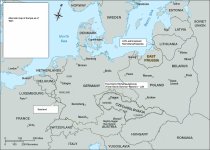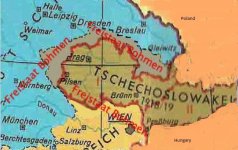raharris1973
Well-known member
What if Masaryk, the father of Czechoslovakia, leads the Czechslovak national movement in a flurry of minimalist realism/conservatism and gets the movement to follow the course below when outlining its goals for an independent state after the dissolution of the Austro-Hungarian empire?
Masaryk determines that a Czechoslovak state should have borders designed to contain an absolute minimum possible German, Hungarian, Polish, and Ruthene populations even if this shrinks the market size, infrastructure, and certain desirable terrain features of the newborn state.
The rationale is a Czech state emerging from under a Germanic dynasty for the first time in 400 years since the Jagiellonian inheritance is pretty remarkable, and aproudly and purely slavic identified Czechoslovak state not vassalized to the German HRE for the first time in the 1,000 years, and harkening back to the old days of Great Moravia is more remarkable still. The neighbors of the Czechoslovak people are Germans, Poles, Ruthenes, and Hungarians, all, or nearly all, more numerous and certainly with longer continuous histories of statehood, and pride in that statehood, who would resent having their nationals governed by a new kid on the block Czechoslovak. Masaryk reasons that this inevitable resentment of the neighbors on all sides, that would come if Czechoslovakia is to claim *all* the territory of the Bohemia Crownlands, Upper Hungary, and Teschen, for example, is a deadly threat to Czechoslovakian national security and even viability. Deadliier, even, than not having mountain ridges on the border, having potential trade barriers imposed on the fringes of Bohemia and Moravia, losing the Teschen rail connection and coal mine, etc.
So having determined that only the continguous Czech and Slovak districts of the Austro-Hungarian empire, and the cities and enclaves within them, are desired, the Czechoslovaks forego historical-geographic claims to all of the historic Bohemian crown land.
It would have the borders shown, inspired by the rump Czecho-Slovak republic after the Munich settlement, but in this ATL they are not the rump territory after Prague is forced to concede territories, rather this is how the state is built from the beginning:
and a close-up:

Czechoslovakia is established in these more conservative boundaries, but otherwise, the postwar treaties are virtually identical to OTL. So at St. Germain, the Austrian Republic simply has all the contiguous majority German-speaking districts of Bohemia and Moravia attached to it. (An Austria extending beyond the old archduchy is not unprecedented - hence, the Austrian republic got Burgenland from Hungary on linguistic grounds) At Trianon, Hungary has the majority Magyar-speaking southern districts of Slovakia, and the Carpatho-Ukraine left with it. Teschen is left to Poland.
Since the Entente is following the rule that no defeated power can *gain* territory, the Sudetenland becomes another one of those odd, League of Nations supervised jurisdictions like the Free City of Danzig, Memelland/Klapeida, and Fiume. This Sudetenland consists of the majority German-speaking districts of western and northern Bohemia and Moravia. Since some of the Moravian districts are not entirely contiguous, the Entente dictates that Germany sacrifice a few districts of Silesia to provide territorial corridor between German Moravia and German Bohemia.
The name for the territory is the "Free District Bohemia-Moravia", or Freier Bezirk Bohmen-Mahren. It may get a nickname in english of Bohemoravia. I also thought of Free County of Bohemia Moravia or Sudetenland, but I don't think they had a Count.
Anyway, other than in this altered Czechoslovakia, there is a butterfly net slapped over the world through the rest of the 1920s and into the 1930s through the Nazi takeover of Germany and the night of the long knives. How do the alliances and diplomacy of the middle and late 1930s play out without the Sudetenland issue?
I imagine Czechoslovakia would seek western (French) guarantees, but could accept or proclaim a neutral status if that fails. I also imagine, that because of its small size, it may offer and promote customs unions with neighbors, above all, Bohemoravia, but possibly also Austria and Hungary, because of their historic role as markets for Czech-Bohemian manufactures. I don't know if any of these neighbors could *get over themselves* and accept the offers however.
See the attached poll question.
Masaryk determines that a Czechoslovak state should have borders designed to contain an absolute minimum possible German, Hungarian, Polish, and Ruthene populations even if this shrinks the market size, infrastructure, and certain desirable terrain features of the newborn state.
The rationale is a Czech state emerging from under a Germanic dynasty for the first time in 400 years since the Jagiellonian inheritance is pretty remarkable, and aproudly and purely slavic identified Czechoslovak state not vassalized to the German HRE for the first time in the 1,000 years, and harkening back to the old days of Great Moravia is more remarkable still. The neighbors of the Czechoslovak people are Germans, Poles, Ruthenes, and Hungarians, all, or nearly all, more numerous and certainly with longer continuous histories of statehood, and pride in that statehood, who would resent having their nationals governed by a new kid on the block Czechoslovak. Masaryk reasons that this inevitable resentment of the neighbors on all sides, that would come if Czechoslovakia is to claim *all* the territory of the Bohemia Crownlands, Upper Hungary, and Teschen, for example, is a deadly threat to Czechoslovakian national security and even viability. Deadliier, even, than not having mountain ridges on the border, having potential trade barriers imposed on the fringes of Bohemia and Moravia, losing the Teschen rail connection and coal mine, etc.
So having determined that only the continguous Czech and Slovak districts of the Austro-Hungarian empire, and the cities and enclaves within them, are desired, the Czechoslovaks forego historical-geographic claims to all of the historic Bohemian crown land.
It would have the borders shown, inspired by the rump Czecho-Slovak republic after the Munich settlement, but in this ATL they are not the rump territory after Prague is forced to concede territories, rather this is how the state is built from the beginning:

and a close-up:

Czechoslovakia is established in these more conservative boundaries, but otherwise, the postwar treaties are virtually identical to OTL. So at St. Germain, the Austrian Republic simply has all the contiguous majority German-speaking districts of Bohemia and Moravia attached to it. (An Austria extending beyond the old archduchy is not unprecedented - hence, the Austrian republic got Burgenland from Hungary on linguistic grounds) At Trianon, Hungary has the majority Magyar-speaking southern districts of Slovakia, and the Carpatho-Ukraine left with it. Teschen is left to Poland.
Since the Entente is following the rule that no defeated power can *gain* territory, the Sudetenland becomes another one of those odd, League of Nations supervised jurisdictions like the Free City of Danzig, Memelland/Klapeida, and Fiume. This Sudetenland consists of the majority German-speaking districts of western and northern Bohemia and Moravia. Since some of the Moravian districts are not entirely contiguous, the Entente dictates that Germany sacrifice a few districts of Silesia to provide territorial corridor between German Moravia and German Bohemia.
The name for the territory is the "Free District Bohemia-Moravia", or Freier Bezirk Bohmen-Mahren. It may get a nickname in english of Bohemoravia. I also thought of Free County of Bohemia Moravia or Sudetenland, but I don't think they had a Count.
Anyway, other than in this altered Czechoslovakia, there is a butterfly net slapped over the world through the rest of the 1920s and into the 1930s through the Nazi takeover of Germany and the night of the long knives. How do the alliances and diplomacy of the middle and late 1930s play out without the Sudetenland issue?
I imagine Czechoslovakia would seek western (French) guarantees, but could accept or proclaim a neutral status if that fails. I also imagine, that because of its small size, it may offer and promote customs unions with neighbors, above all, Bohemoravia, but possibly also Austria and Hungary, because of their historic role as markets for Czech-Bohemian manufactures. I don't know if any of these neighbors could *get over themselves* and accept the offers however.
See the attached poll question.

